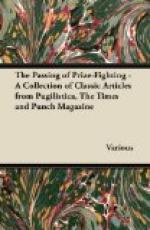[Illustration: “THE FREEDOM OF THE SEA.”
HOLLAND. “YOU’VE TAKEN A GREAT LIBERTY WITH ME.”
GERMANY. “OF COURSE I HAVE. I’M THE APOSTLE OF LIBERTY.”]
* * * * *
[Illustration: THE THEATRE OF WAR.]
* * * * *
THE SOLACE.
Mr. William Wood, grocer, of Acton, was very tired. And no wonder, for not only had he lost his two assistants, both having been called up, but the girls who had taken their places were frivolous and slow. Moreover his errand boy had that day given notice. And, furthermore, the submarine campaign was making it every day more difficult to keep up the stock, and the rise in prices meant anything but the commensurate increase of profit of which he was accused by indignant customers.
Mr. Wood, therefore, was not sorry when, the shutters up, he could retire to his sitting-room upstairs and rest. His one hobby being reading, and his favourite form of literature being Lives and Letters, he had normally no difficulty in dismissing the shop from his mind. He would open the latest memoir from the library and lose himself in whatever society it reconstructed, political for choice. But to-night the solace could not so easily be found. For one thing, he had no new books; for another, the cares of business were too recent and too real.
He sank into his armchair, covered his eyes with his hand, and pondered.
Then suddenly he had an idea. If there were no letters of the Great to read, he would himself write to the Great and thus escape grocerdom and worry. If he were not a person of importance, he would at least pretend to be, and thus be comforted.
Seating himself at the table and taking up his pen, he composed with infinite care the following chapter from a biography of himself:—
The year 1916 was a comparatively uneventful one in the life of our hero. The principal events were the marriage of his youngest daughter with the son of the Bishop of Brighton and the rebuilding of The Towers after the fire. Perhaps the most important of his new friends were the Archbishop of CANTERBURY and Sir HEDWORTH MEUX, but unfortunately Sir HEDWORTH has not kept any of the letters. Nor is there much correspondence; but a few letters may be printed here, all testifying to the multifarious interests of this remarkable man, who not only knew everyone worth knowing, but projected himself into their careers with so much sympathy and keenness. The first is to the then Prime Minister:—
To the Right Hon. H.H. ASQUITH, M.P.
MY DEAR ASQUITH,—This is only a line to remind you that you lunch with me at the Primrose Club on Monday at one o’clock. I have asked two or three friends to meet you, all good fellows. With regard to that matter on which you were asking my advice, I think that the wisest course at present is (to use the phrase, now a little stale, which I invented for you) to wait and see. Let me say that I thought your speech at the Guildhall a fine effort. Kindly remember me to the wife and Miss ELIZABETH, and believe me,




